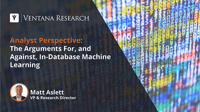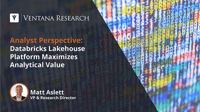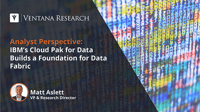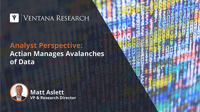Almost all organizations are investing in data science, or planning to, as they seek to encourage experimentation and exploration to identify new business challenges and opportunities as part of the drive toward creating a more data-driven culture. My colleague, David Menninger, has written about how organizations using artificial intelligence and machine learning (AI/ML) report gaining competitive advantage, improving customer experiences, responding faster to opportunities and threats, and...
Read More
Topics:
Data Governance,
Data Management,
Data,
data operations,
AI & Machine Learning,
Analytics & Data,
analytic data platforms
I have previously written about growing interest in the data lakehouse as one of the design patterns for delivering hydroanalytics analysis of data in a data lake. Many organizations have invested in data lakes as a relatively inexpensive way of storing large volumes of data from multiple enterprise applications and workloads, especially semi- and unstructured data that is unsuitable for storing and processing in a data warehouse. However, early data lake projects lacked structured data...
Read More
Topics:
Business Intelligence,
Data Governance,
Data Management,
Data,
AI & Machine Learning,
Streaming Data & Events,
analytic data platforms
I have written recently about the similarities and differences between data mesh and data fabric. The two are potentially complementary. Data mesh is an organizational and cultural approach to data ownership, access and governance. Data fabric is a technical approach to automating data management and data governance in a distributed architecture. There are various definitions of data fabric, but key elements include a data catalog for metadata-driven data governance and self-service, agile data...
Read More
Topics:
business intelligence,
Cloud Computing,
Data Governance,
Data Management,
Data,
data operations,
AI & Machine Learning,
operational data plaftforms
In their pursuit to be data-driven, organizations are collecting and managing more data than ever before as they attempt to gain competitive advantage and respond faster to worker and customer demands for more innovative, data-rich applications and personalized experiences. As data is increasingly spread across multiple data centers, clouds and regions, organizations need to manage data on multiple systems in different locations and bring it together for analysis. As the data volumes increase...
Read More
Topics:
Data Management,
Data,
data operations,
analytic data platforms













